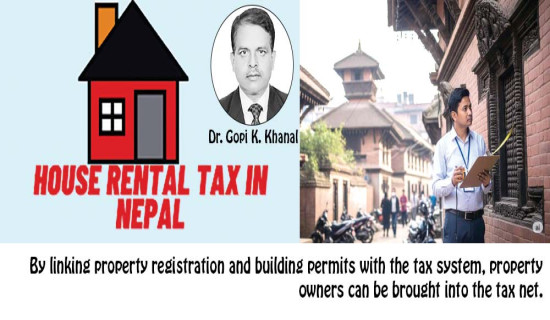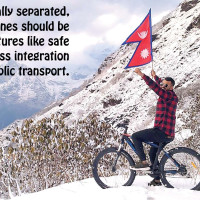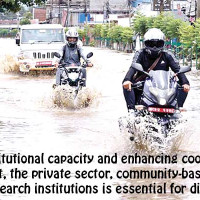- Sunday, 14 September 2025
Microphone, My Teacher
Dale Carnegie, a late American writer and lecturer (1888–1955), in one of his famous books, “How to Develop Self-confidence and Influence People by Public Speaking,” whispers gently to his readers how public speaking should be dealt with if one chooses a path aspiring to become a public speaker and which tools of excellent speaking and delivery skills are essential or conspicuous in order to face a large, enthusiastic public crowd. Carnegie defines his audience as follows: “Every audience becomes sensitive. They are, in fact, as sensitive as a shy grass.” As a radio broadcaster and being the Master of Ceremony on different occasions in my lifetime in Kathmandu and elsewhere since 1968 and beyond, I have always felt immersed in the speaking culture with utmost sincerity, having to shepherd my voice and presentation with a diligent preparation.
Confidence is yet another important factor that is guided by actions because, as Dale Carnegie puts it, “action seems to follow feelings, but real action and feelings go together.“ Even at the end of the 1960s in Nepal, public speaking could not gain any momentum because the number of enthusiastic broadcasters and programme presenters was more or less in the state of hibernation, meaning it was an arduous task to find eligible public speakers then. Providence called me in and entrusted me with a great task: doing something outstanding in public speaking as well as in broadcasting in Nepal.
One Nepal-Pakistan Friendship Association Anniversary programme organised by the Science Faculty students of the Tri-Chandra College in 1968 laid a systematic foundation for English public speaking in Nepal when I was given the reins of the Master of Ceremony for the aforesaid programme, the resounding success of which brought me into the limelight, adding layers to my long-cherished dream of embracing a speaking career.
Inspired by this great opportunity and the nascent success one after another, by the grace of God, I gained momentum in my fortitude, and I transformed myself into a researcher actively seeking opportunities for even better public speaking than ever. I started frequenting British and American libraries in Kathmandu in quest of more knowledge and skills in radio broadcasting and public speaking.
After some of my research studies in both genres, I came across many interesting and knowledgeable facts, which I am now mentioning here. My main aspirations to become a good speaker in the formative years took me to the further domains of the most striking rules that every successful speaker must adopt, and these are! “Do not sit down and make a speech in thirty minutes. A speech cannot be cooked to order, like a steak or so. A speech must grow,” the narrative goes on: “Plan your programme early in the week; think over it, brood over it, sleep over it, and dream over it! Discuss it with your friends. Make it a topic of conversation. Ask yourself all possible questions! Put down on pieces of paper all the thoughts and illustrations that come to you, and keep reaching out for more!
Ideas, suggestions, and illustrations will come drifting to you at various times when you are bathing, when you are driving, or when you are waiting for dinner to be served.” That was Abraham Lincoln’s method, which also served as guidelines for my effective handling of speech deliveries in the following formative years. This might sound paradoxical because English programme speaking and writing in the entertainment sector were extremely minimal in Nepal then.
As I said earlier, the early stages of broadcasting as well as public speaking were cumbersome because induction into any kind of job in those days meant “trying to put the best foot forward,” and, believe me, even getting one by any chance was something like taking “a bull by the horns.”. Interestingly enough, for many, despite the hard-earned opportunities, it was also like “flogging a dead horse." They could not go any further in their career despite their perseverance and hard work.
As stated already, the essence of public speaking in Nepal did lack qualified public speakers in those days due to poor education and the ever-deteriorating English eloquence level. Adding to that was the failure of those involved in broadcasting and public speaking to qualify themselves with a good vocabulary and speaking techniques.
In my opinion, what a good public speaker needs even today is self-confidence and a strong willpower to overcome some of the odd circumstances one normally encounters when the speech and voice are at play on the stage or studio.
Going back to Dale Carnegie again. On maintaining self-confidence, he says, “Start with a strong, persistent desire and know thoroughly what you are going to talk about!”
Based on my own experience, I also strongly advocate the idea that self-confidence is not a gifted element. It is the result of constant practice. You cannot feel confident unless you know what you are going to say. I do not want to be too philosophical and propound punditocracy in my views on broadcasting and public speaking here, yet my own experience in this domain has revealed that, self-confidence apart, correct breathing is the greatest technical essential for speakers because it is the foundation of voice that adds layers to success.
Many speakers may differ at this point with the argument that this is not all a prerequisite for speakers in any circumstances. Ok! Then please try it otherwise! You will know the results yourself.
Impetuous behaviour in speaking and showcasing negative experiences adds much to the uninvited disappointment of the speakers. People with a choleric attitude should not opt for a speaking profession at all because it creates instability and more nervousness and even instigates arrogance with the audiences, failing to infuse the much-required enthusiasm and success among them.
Another most conspicuous quality of a good public speaker, based on my own experiences, is keeping the audience within your facts and voice control. However, this is not possible at all with rowdy audiences that fail to understand the spirit of the programme. We call them “snowflakes,” meaning that they are easily offended by the statements or actions of the speaker. So, here is a statutory warning to the speakers and broadcasters! “Look before you leap!”
With utmost sincerity and straightforwardness, I successfully embarked upon some of my iconic talks with various heads of state of governments in line with radio interview programmes at different intervals in the 70s, 80s, 90s, and beyond. Most notable among them were the radio interviews I conducted with the late US Secretary of State, Dr. Henry Kissinger; the late President of Bangladesh, General Mohammed Ershad; the late Prime Minister of Singapore, Lee Kwan Yew; the late Indian Prime Minister Chandra Shekhar; and the late US Secretary of State, Collin Powell.
Not to forget other significant talkings during the coronation of His Majesty King Birendra Bir Bikram Dev (1975) and the first ever running in English done by me and legendary Gauri K. C., during that occasion, together with our counterparts of the Nepali News Section.
My very famous interviews in Kathmandu during the coronation were also with the attending guests from various countries, e.g., the late Dr. Christiaan Barnard, a South African cardiac surgeon who performed the world’s first human-to-human heart transplant operation on December 3, 1967.
Then with the First Lady of the Philippines, Madam Imelda Marcos, and other high-ranking dignitaries and guests.
All my interviews, wherever possible, were taken in accordance with the guidelines as propounded by Dale Carnegie in his book that I have already mentioned.
Despite the success one after another in my life as a broadcaster and public speaker, I never deprecated others in their performances; instead, I remained demure with due respect to their speaking career. Oh! What an ebullient career I had in my time as a speaker!
The results of my analysis of speakers today are that I will not say that they are ignominious and imperious. However, I must take the liberty here in bringing the point to note that many speakers today somehow fail to exude cheerfulness and charisma in their speech quality to impinge on the listeners and spectators. In short, many are now victims of grandiloquence in their presentation; in other words, their lofty, pompous language cannot remain incontrovertible. Here is one more remark on such speakers: “The man who tries to be very serious or very witty may easily fail, says Martin W. Littleton. He goes on further to suggest: “Above all else, open your mouth and speak so that you can be heard.”
True! People should open their mouths so that they can be heard. But what if they cannot be heard at all?
My own experiences in broadcasting and public speaking have always consisted of digging something out of myself, assembling and arranging my own thoughts, cherishing and nurturing my own convictions, and later transmitting them to the audience.
One striking example of stressing words in public speaking can be traced back to Napoleon’s brilliant speech. Here, his famous speech stress is printed in bold!
“I have succeeded in whatever I have undertaken because I have willed it. I have never hesitated, which has given me an advantage over the rest of mankind.”
The above text is in itself of multifarious character and profound diction.
It expounds perfect guidelines for neophytes on the job, indeed. It is also a pragmatic approach to solving the anomalies in their presentation. The candour of the presentation must, by all means, impress the audience. A pretentious handling of problems will affect public speaking to a large extent because it not only reveals your personality but also whispers how smarter you are trying to become than you actually are. Speakers of this character or calibre easily fall prey to sycophancy. So, please watch out!
Delivery, in my view, should be conversational. Dale Carnegie adds, “Your hearers ought to feel that you are experiencing the joy of talking." Here, I would like to elaborate on the above point a bit. It is advisable to ask yourself, “What is the worst that can possibly happen to me on the day I am going to speak?” Well! I have faced this kind of dilemma time and again, and the solution guides me to calmly proceed in order to improve the worst, if any. Yet another conspicuous point in speaking is being caught in the maze of confusion when one stands unprepared in front of a large, enthusiastic audience. This is the situation where many speakers fail, and a condition like this could even lead to some catastrophic results, e.g., a total breakdown with nervousness and failure.
But when all goes well as planned, the speaker gets back home with a purified mind echoing with the success of the work done and not having sleepless nights counting “stars under the ceiling.”.
The kind of recognition I garnered from my successive speaking career helped me pave the way for a much broader spectrum in speaking, even to the different genres of audiences in Kathmandu, reaching the point where I frequently got the opportunity to present the programmes in the presence of royalties, heads of state, or government during their state and official visits to Nepal!
The tumultuous era during my early years helped me shape the trajectory of speaking in my later life.
Platform presence and personality were of the utmost priority in my burgeoning broadcasting and public speaking careers as well. Some of my secrets are here!
Independent of radio broadcasting on occasions of public speaking, I never spoke when I was tired, ate sparingly before I spoke, did nothing to dull my energy, dressed neatly and attractively, smiled, crowded my audience together, never stood behind furniture, and got the gestures out of my own impulses.
This is where the late American poet Douglas Malloch, in his writing, holds true to the essence and spirit of being in a society. He writes, “If you can’t be a highway, then just be the trail. If you can’t be the sun, be a star. It isn’t by size that you win or fail. Be the best of whatever you are.”
So, God help all the speakers. Thank God! I never had to placate anybody for jobs in my career. Yes! Indeed! My early ventures into public speaking were also marked by agoraphobia. I did spend quires and quires of papers to take down the notes from other sources and practiced the reading with broken analogue telephone sets with reports and excerpts taken from Nepal’s oldest and esteemed English daily, “The Rising Nepal,” during my starting years as a broadcaster and public speaker. My humble gratitude to “The Rising Nepal” for helping me with great textual slices of success.
During preparing for my speaking crusade, I took great care to avoid fallacious words and expressions and any kind of florid language.
The quality of savour-faire has always been a big concern among speakers, not only in Nepal but also in other developed countries.
What I never forgot as I reached the pinnacle of my speaking career was the fact that the candour of my speech always impressed the audience.
These human qualities predestined me to graduate with honours among my vast number of fans and well-wishers!
Attention speakers! Please kindly remember this! With success at your feet, it is always good to see you basking in the afterglow of your speaking fame!
God help everybody! Not to forget here are particularly the young and upcoming speakers who resonate with the work I have done all throughout my career. The microphone that taught me about the intricacies and secrets of speaking in the public domain in Nepal is indeed my greatest teacher of all.
(The author is a retired senior English news editor and broadcaster at Radio Nepal.)









-original-thumb.jpg)







